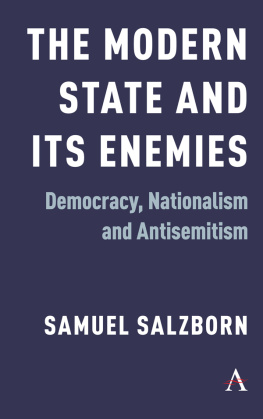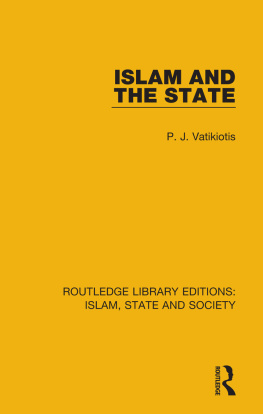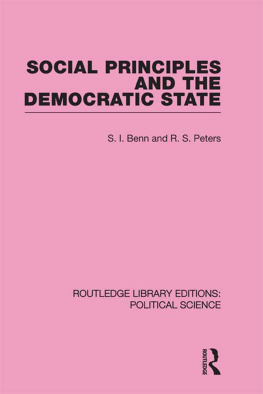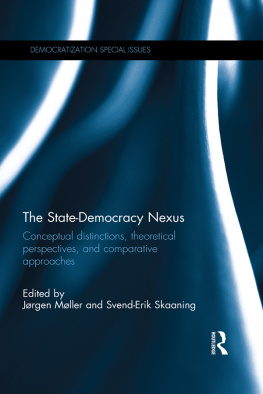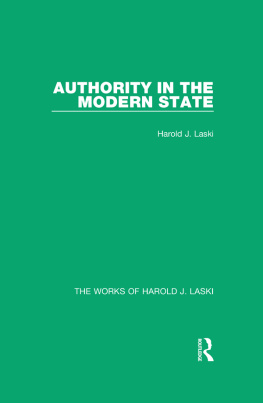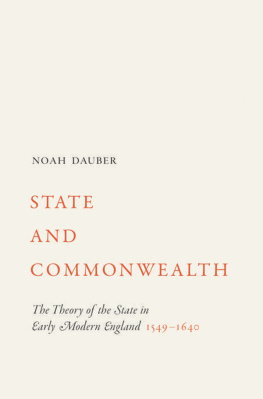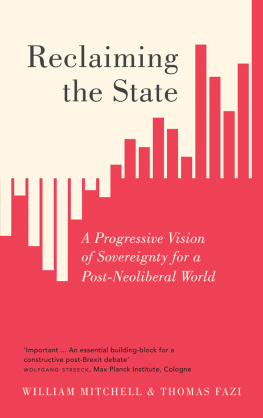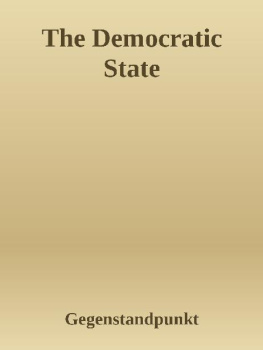The Modern State and Its Enemies
The Modern State and Its Enemies: Democracy, Nationalism and Antisemitism
Samuel Salzborn

Anthem Press
An imprint of Wimbledon Publishing Company
www.anthempress.com
This edition first published in UK and USA 2020
by ANTHEM PRESS
7576 Blackfriars Road, London SE1 8HA, UK
or PO Box 9779, London SW19 7ZG, UK
and
244 Madison Ave #116, New York, NY 10016, USA
Copyright Samuel Salzborn 2020
The author asserts the moral right to be identified as the author of this work.
All rights reserved. Without limiting the rights under copyright reserved above, no part of this publication may be reproduced, stored or introduced into a retrieval system, or transmitted, in any form or by any means (electronic, mechanical, photocopying, recording or otherwise), without the prior written permission of both the copyright owner and the above publisher of this book.
The book is supported by funding from the Amadeu Antonio Foundation, Berlin.
British Library Cataloguing-in-Publication Data
A catalogue record for this book is available from the British Library.
Library of Congress Cataloging-in-Publication Data
A catalog record for this book has been requested.
ISBN-13: 978-1-78527-220-2 (Hbk)
ISBN-10: 1-78527-220-9 (Hbk)
This title is also available as an e-book.
Contents
In focusing on the modern state and its enemies, this book considers the historical intellectual developments that provided the fundaments of the modern state, informed the key theoretical questions arising in the democratic context (e.g., representation, participation, policing and the use of force) and shaped the relationship between (state) sovereignty and (individual) liberty. The modern state as a nation-state is thus based on the relationship between its territory, its people and its sovereign authority. As a result, nationalism and minorities policy are issues that are key to the states self-conception. But historically, these have also been repeatedly used as weapons against the state, manifesting in separatism, irredentism and antidemocratic agitation. Both antisemitism and right-wing extremism have historically stood in opposition to the democratic state and continue to do so today. Antisemitism in particular is antithetical to modernity, as it fundamentally rejects equality and individual liberty.
Democracies still face threats to their existence today. With autocratic regimes, political power is clearly based on the executive prerogative, meaning the use of force by police and military, thereby guaranteeing domestic stability through the threat andif necessaryuse of force (assuming there is no military intervention from abroad) ().
In the global history of democratization over the past three centuries, there have been many cases of democratized states becoming destabilized through the actions of opponents both domestic and foreign (e.g., in South America and Southeast Asia), reflecting a constant interplay both qualitatively and quantitatively between democratic expansion and autocratic rollback (). Within the domestic sphere, democracies are faced with extremist forces trying to undermine their democratic foundations in order to establish an authoritarian or totalitarian system, while in the international arena, they are confronted by autocratic regimes with antidemocratic intentions.
So there exists a complex interplay between democracy and autocracy in which the two models of governance compete not only domestically for sovereign control over a territory and its people but also internationally between rival states. If the democratization wave theory formulated by Samuel Huntington (proliferation of democratic regimes around the world, while also allowing for the vague expectation that democratic models of governance will eventually prevail in time, even in the face of autocratic alternative systems.
In this sense, the story of democracy has always been a story of fragility, which also has to do with the nature of democracy itself. This is because democratic governance models are based on an Enlightenment ideal in which the person is not only to be treated as an individual but should also become a mature political subject. The philosophical ideals of the Enlightenment are politically implicit in the democratic model. What this Enlightenment philosophy has promised the individual is nothing moreand nothing lessthan a shift from a passive object of history to an active subject of politics. What primarily distinguished the premodern mode of governance was that it did not need to justify itself as such. Its objective power stemmed from not subjectively needing to legitimize itself, since its own claim of divinity had already made it sacrosanct. But now that individuals were free of their premodern constraints, they were also to become aware of their own subjectivity, to recognize themselves as born free (Rousseau , 5) and capable of learning and to emancipate themselves from their self-incurred immaturity (Kant 1784, 53). As both bourgeois philosophy and liberal theory, Enlightenment thinking committed the individual to freedom without being able to guarantee itor even wanting to do so.
In its liberal aspect, this promised freedom from coercion not only implied a freedom from security but also entailed two other double-edged consequences, in its dialectic of public sphere versus private sphere, and in its contradiction between rights and economics. The latter guaranteed equality as a legal ideal, but one that ensured economic inequality while also legitimizing it, thereby realizing freedom as a theoretical equality while actually segmenting and differentiating society in its claims of universality; meanwhile, the former constituted the very core of bourgeois governance in its separation of public sphere from private sphere, a separation that promised freedom while also suspending it. While the public sphere was the site where the contract between free and equal brothers (Pateman , 32) resulted in the partitioning of a legal system independent of the political sphere, this also generated the private sphere as a gendered site of reproduction, thereby establishing a basic precondition for the industrial division of labor. Public-sphere freedom was only to be achieved through private-sphere unfreedom for societys female majority. Therefore, the premise of freedom in the private sphere was always structurally dependent on the reproducing of production frameworks that were founded upon a false promise of freedomfalse for being halved in two ways. So while the public sphere became the site of the political, the private sphere became the site of the public spheres gendered reproduction.
) itself, on its underlying premises and assumptions that are both deeply self-contradictory and inescapably caught in this self-contradiction. Here, emancipation from the theological paradigm ultimately meant replacing it with a natural science onea paradigm shift in which emancipation was also inscribed with its opposite. This dichotomy arises because on the one hand, while the new rationalism may have freed the individual from the bonds of Christian subordination, it could not offer a sense of meaningfulness like that of the theologians, one capable of fulfilling the threatening emptiness of human life and the deep yearning for transcendence, which are tied to humanitys innate fear of what Hobbes (1651) called the greatest possible evil: death, of which only humans, alone among all living creatures, are ultimately aware of, and which shapes them in their every worldly action, both consciously and subconsciously. On the other hand, this dichotomy also arises because emancipation was based on a natural science understanding that replaced an irrational faith in God with an irrational faith in Nature, one that ushered in a process of emancipation, albeit only for the light-skinned male part of societyan emancipation that every progressive movement has tried to expand since then. However, this new faith in nature and science would not only take humanitys former humility and transform it into a fantasy of omnipotence in which everything could be conquered and controlled but also lead to the classification, segmentation and hierarchization of all humanity and, in this sexist, racist, colonialist and antisemitic enterprise, to the invention of more and more categorical distinctions that would stamp out, both symbolically and concretely, the great trauma of the Enlightenmentnamely, the awareness of ones own mortalitythrough ostensibly natural and scientific hierarchical systems, ones resulting in oppression and subjugation as well as persecution and extermination.

